

If you haven’t checked this out yet, you need to. Now.
According to the New York Times, Walmart fueled its rapid expansion in Mexico with millions in bribes paid to get building permits and land use approvals through quickly. The story is based on a whistleblower, who told Walmart leadership about the issue, which they confirmed was very likely true before allegedly sweeping the whole thing under a rug. The Washington Post reports that the Department of Justice is investigating.
From an L.A. perspective, the money quote is here: “In an interview with the Times, Mr. Cicero said Mr. Castro-Wright had encouraged the payments for a specific strategic purpose. The idea, he said, was to build hundreds of new stores so fast that competitors would not have time to react. Bribes, he explained, accelerated growth. They got zoning maps changed.
» Read more about: WebHot: Walmart Bribery Scandal Explodes »
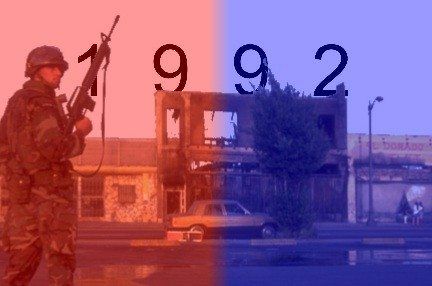

(Editor’s Note: Frying Pan News continues its series about the 1992 unrest with this account told to us by Erin Aubry Kaplan.)
I was living in Inglewood in 1992. When the verdicts came in I was getting a facial — we were all really outraged in the salon. At that time I was teaching adult education courses — basic English and math for GED exams, plus ESL classes. I felt like I had to do something and a teacher friend and I heard there was a rally at the First AME Church. I was excited — I hadn’t really seen this kind of energizing in L.A. before. But as we drove to FAME people were filling up the streets and the energy felt dangerous.
We never made it: This guy threw a trash can into the street and someone tried to stop a motorist.
» Read more about: 1992 Remembered: From Inglewood to Brentwood »
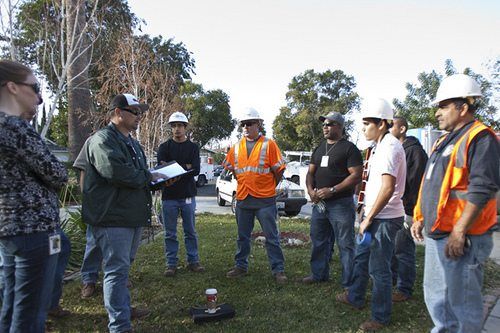
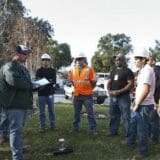
The Los Angeles Department of Water and Power’s preliminary budget will come before the Los Angeles City Council today. There’s lots there to consider, from hundreds of millions of dollars for rebuilding local power plants and renewable energy to hundreds of millions more to replace an aging distribution system.
Buried in the budget is a piece of good news that deserves some recognition. The LADWP’s $88 million energy efficiency budget is looking more respectable than it has in the past and more on par with other utilities. Last year, the Department spent $50 million. This year’s budget is not quite where it should be, but it’s moving in the right direction.
That is due in large part to a campaign led by RePower LA, a citywide coalition of community groups, environmentalists, small businesses and IBEW Local 18 committed to expanding energy efficiency investment in a way that leads to career-path jobs,
» Read more about: Community Activism Powers Energy Efficiency at LADWP »
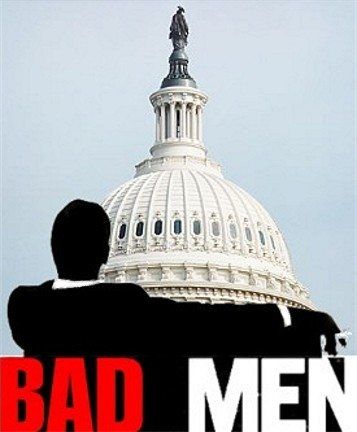

Three weeks ago March Madness in Washington gave way to April Apoplexy, a time when conservatives put aside the boring tasks of creating jobs, loosening credit and saving people’s homes in order to follow their true passion – kicking the ladder away from Americans who are trying to climb up to better lives. And what easier way to do this than to gut the work of the National Labor Relations Board (NLRB), an agency that has become a favorite chew toy of Congressional right-wingers?
Remember the doomsday predictions made by the U.S. Chamber of Commerce and others when the NLRB insisted that businesses put up the board’s tiny poster advising employees of their rights? That teapot tempest is now clogging up the federal courts, thanks to the chamber, but such mischief is nothing compared to what the chamber’s caddies in Congress have been up to.
» Read more about: Anti-NLRB Vote: A Dark Victory for Conservatives? »


(Editor’s Note: This post, written by Twilight Greenaway, originally appeared on Grist, about the same time a bribery scandal allegedly involving Mexican Walmart officials began unfolding.)
Shrimp has been hovering near the bottom of the list of things I will eat for a while. Unless you make a point to get it wild, chances are very good it has been raised in a crowded pond and treated with loads of antibiotics. Factor in its mammoth carbon footprint, and the fact that many of the developing world’s mangroves have been displaced in recent years to make room for shrimp farms, and my appetite for these crustaceans all but disappears.
Now we can add labor abuse to shrimp’s laundry list of problems.
A group of shrimp workers has been protesting dismal conditions in a Thai factory for weeks.
» Read more about: Walmart's Thai Shrimp: A Jumbo PR Nightmare »


(Editor’s Note: This post first appeared on Dr. Pop.)
On April 27, 1992, my mother had to make probably one of the most difficult decisions in her life— to take my grandmother off life-support. I was eight years old and I remember standing in the hallway, outside Mama Toya’s room because the doctors and nurses said I was too young to see her. Her long battle with colon cancer was finally over; this painful disease had transformed a vibrant and resilient woman into a frail 40-pound shell of a person. She was finally at peace. The pillar of our family left this earth as Los Angeles was at the brink of burning in flames.
Victoria Quintanilla, better know to us as Mama Toya or Niña Toya, arrived to the United States in 1986, six years after my mother came to Los Angeles and three years after I was born.


 Writer Patty Lovera has an illuminating – if alarming – takedown of Walmart’s frequent green boasting. Her Grist feature, “Top 10 Ways Walmart Is Failing on Sustainability,” points out that while “Walmart’s green PR machine has been running on overdrive lately,” the retail giant gets an F on its environmental and social report card in 10 critical categories.
Writer Patty Lovera has an illuminating – if alarming – takedown of Walmart’s frequent green boasting. Her Grist feature, “Top 10 Ways Walmart Is Failing on Sustainability,” points out that while “Walmart’s green PR machine has been running on overdrive lately,” the retail giant gets an F on its environmental and social report card in 10 critical categories.
Summarizing an analysis done by Food and Water Watch, Lovera notes, among other things, that Walmart falls flat by gobbling up previously undeveloped land for its big box stores, selling organic versions of processed products made by industrial food giants and spreading poverty by degrading the quality of life of neighborhoods where it locates.
Lovera also takes aim at Walmart’s recently published, 126-page Global Responsibility Report that ballyhoos the beneficial role Walmart plays on the environmental stage and in the lives of its employees and the communities it operates in.
» Read more about: WebHot: Walmart's Bad Green Report Card »


It was a Wednesday night and my son was watching the news on TV in his room while I fixed dinner. “Dad,” he called from the bedroom, “Dad, you better get in here and see this.”
“This” turned out to be the beginnings of the worst urban social upheaval in American history. Its early moments were caught on film by a news helicopter high over the intersection of Florence and Normandie. We watched, transfixed, as some black kids pulled a white truck driver out of his cab and one of them hit him with a brick. An Asian woman was threatened as she tried to make a right turn off Normandie onto Florence, her face etched with fear. Car windows were broken. The news commentators called them “hoodlums” and the police were nowhere in sight. Then we watched as the city began to burn.
I was an undergrad at UC Santa Barbara when Watts upended L.A.
» Read more about: 1992 Remembered: Driving Into the Wreck »

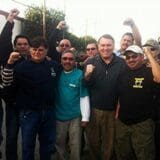
On April 11, port truck drivers working for Australian transportation conglomerate Toll voted by a 3-1 margin to join the Teamsters. They were the first port truck drivers in a generation to vote to unionize, giving hope to the 11,000 other drivers in the region trying to improve their generally miserable working conditions. (See video below.)
The victory came despite the efforts of Joseph Brock, a former Teamster turned anti-union consultant parachuted in by Toll to discourage workers from organizing. Union busters have become a standard feature of contemporary union organizing, trading on intimidation, false promises and even illegal firings.
Brock’s message was a well-worn one – unions are like businesses, they are only looking for dues, they ignore or misrepresent their members and so on. But he wasn’t a slick attorney in a suit or a browbeating manager. The fact that he’d been a union official for over a decade and came from a die-hard union family was supposed to carry weight with Toll drivers.